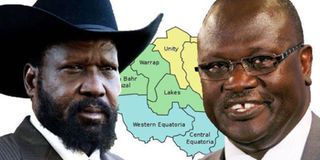African elections to watch out for in 2018

South Sudan President Salva Kiir and Dr Riek Machar
For many African countries, 2017 was the beginning of a new era. Long-term rulers departed in Zimbabwe, Angola and the Gambia; internal dissent, economic challenges, and increasing unemployment rates pressured many countries, including Ethiopia and Nigeria; and a divided ruling party in South Africa showed an electorate disenchanted with liberation movements.
Some of these internal and external pressures will feature in elections across the continent in 2018. More than 20 nations will hold presidential, legislative and municipal elections this year, with the expectation that some of the results might herald a political sea change for party juggernauts.
Presidential campaigns in both South Africa and Nigeria will also heat up ahead of the 2019 polls, with African National Congress leader Cyril Ramaphosa and president Muhammadu Buhari both hoping to win, respectively. As millions of African voters head to the polls in the next 12 months, here are the elections to watch for, in chronological order:
Egypt, between February—May 2018
Even though he is yet to declare his candidacy, president Abdel Fattah el-Sisi is still the man to beat in Egypt’s upcoming presidential election.
While former prime minister Ahmed Shafiq and prominent human rights lawyer Khaled Ali have declared their intentions to run, many candidates will face obstacles getting on the ballot, let alone win. There have also been reports that Anwar Sadat, nephew, and namesake of Egypt’s former assassinated president, was considering a run for the top job.
The polls come as Egypt grapples with a sharp economic downturn and a surge in deadly terrorist attacks that continue to put a dent in its image as a favourite tourist destination. Sisi’s government continues to crack down on activists.
Sierra Leone, March 7
This West African nation will hold general elections in early March, with more than a dozen parties fielding candidates in presidential, parliamentary, mayoral and municipal elections. The ruling All People’s Congress has appointed foreign affairs minister Samura Kamara as the successor to president Ernest Bai Koroma, who will step down after a decade in power.
The 2018 elections come at a crucial moment as Sierra Leone recovers from the devastating impact of Ebola and a tragic mudslide that killed hundreds of people and displaced more last year.
South Sudan, July 2018
The world’s newest nation is expected to hold general elections amid a brutal civil war that has displaced millions of people both inside and out of the country. The infighting between rival government and rebel forces has torn apart the nation, devastating the economy, affecting humanitarian operations, and foreign investment—all while the leaders of the two opposing sides amassed millions of dollars in illegal wealth.
As the government’s term comes to an end in February, president Salva Kiir wants to hold elections. This is proving to be impossible, given that the government lacks the necessary funds and the security to register voters and conduct elections.
Mali, April to Nov 2018
Landlocked Mali will hold regional, presidential and national elections in various stages, beginning in April and ending in November. Elections were set to begin in mid-December but were delayed over security concerns, and whether the opposition and rebel groups party to the 2015 Algiers Accord to bring stability to the nation’s vast northern desert would take part in the process.
The region was overtaken by Islamist militants in 2012, and though they were ousted by a French-led multinational force, the groups have staged deadly attacks on civilian and military establishments.
Zimbabwe, July – August 2018
With Robert Mugabe out of way, president Emmerson Mnangagwa is expected to lead his Zanu-PF party into the presidential polls between July and August. Mnangagwa, 75, has already said the election will be “credible, free, fair and transparent” and should help define a new trajectory for the cash-strapped and impoverished nation.
Both Mnangagwa and the ruling party will face questions about how to revive the economy, deal with the scarcity of fuel and foodstuffs, currency instability, and ballooning unemployment rates.
Cameroon, October 2018
With 36 years in power, president Paul Biya is one of the longest-serving African leaders still in power. At 84, Biya is expected to run again in the country’s general elections in October. The polls in the Central African nation come after more than a year-long crisis in its Anglophone regions, leading to violent crackdowns and anti-government protests.
The simmering tensions also led the government to shut down the internet in the two northwest and southwest regions, where residents have complained of political and economic discrimination for decades.
Libya, date to be declared
With no exact date in place, Libya’s UN-backed government says it’s pushing ahead with preparations for presidential and legislative elections to take place in 2018. According to the electoral commission, around one million voters have registered for the upcoming polls, which includes a vote on a new draft constitution.
Among the people mulling a run for president: Saif al-Islam Gaddafi, the son of the former Libyan dictator, Muammar Gaddafi.
- Quartz Africa




